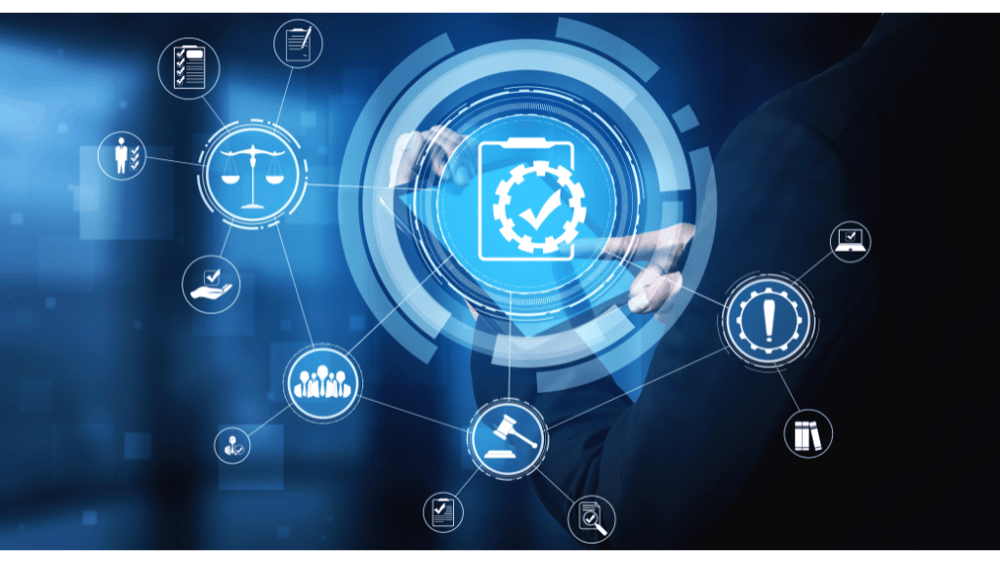Governance and Compliance in AWS AI Projects
AI Technology AWS AI Services Oct 23, 2024 9:00:00 AM Ken Pomella 6 min read

As artificial intelligence (AI) continues to revolutionize industries, many organizations are leveraging cloud platforms like Amazon Web Services (AWS) to develop and deploy AI solutions at scale. While AWS provides robust tools and services to facilitate AI and machine learning (ML) projects, organizations must also prioritize governance and compliance to ensure the responsible and legal use of AI technologies. Without proper governance, AI projects can expose organizations to significant risks, including regulatory penalties, data breaches, and reputational damage.
In this blog, we’ll explore the importance of governance and compliance in AWS AI projects, outlining best practices for managing data, meeting regulatory requirements, and maintaining ethical AI systems.
The Importance of Governance and Compliance in AI
Governance and compliance ensure that AI projects operate within legal and ethical boundaries, safeguarding both the organization and end-users from unintended consequences. As AI systems handle sensitive data and make critical decisions, failing to implement strong governance and compliance measures can lead to biased outcomes, privacy violations, and security vulnerabilities.
Key aspects of governance and compliance in AI include:
- Data Privacy: Ensuring that AI systems protect personal and sensitive data in accordance with regulations like GDPR and CCPA.
- Bias and Fairness: Establishing processes to prevent bias in AI models and ensuring fairness in decision-making.
- Transparency: Maintaining transparency and explainability of AI models, allowing stakeholders to understand how decisions are made.
- Accountability: Defining clear roles and responsibilities for managing AI systems and addressing issues that may arise.
AWS AI Governance: Key Services and Tools
AWS offers a range of tools and services to help organizations manage governance and compliance in their AI and ML projects. These services allow businesses to maintain control over data, monitor AI model performance, and ensure adherence to regulatory requirements.
1. Amazon SageMaker Clarify
One of the key challenges in AI governance is addressing bias and ensuring fairness in machine learning models. Amazon SageMaker Clarify helps organizations detect bias in datasets and models, providing insights that enable data scientists and ML engineers to mitigate bias before deploying models.
Key Features:
- Bias Detection: SageMaker Clarify can analyze both training datasets and model outputs to detect potential biases, such as disparities in predictions across different demographic groups.
- Explainability: The tool also provides model explainability, helping stakeholders understand the reasons behind a model’s predictions.
- Integration with SageMaker Pipelines: SageMaker Clarify can be integrated with SageMaker Pipelines to automate bias detection and explainability across the ML lifecycle.
Best Practice: Regularly incorporate SageMaker Clarify into your AI workflows to monitor models for bias, especially in high-stakes applications such as healthcare, finance, and hiring.
2. Amazon Macie
Data governance is a critical component of AI compliance, particularly when working with sensitive or personally identifiable information (PII). Amazon Macie is an AWS service that uses machine learning to detect and classify sensitive data, helping organizations manage and protect critical information stored in AWS.
Key Features:
- PII Detection: Macie automatically scans Amazon S3 buckets for sensitive data, identifying PII such as credit card numbers, addresses, and social security numbers.
- Security and Compliance: Macie’s dashboard provides an overview of security risks and compliance gaps, allowing teams to take immediate action to protect sensitive data.
- Custom Alerts: Set up custom alerts for unauthorized access to sensitive data or other suspicious activity, ensuring that security incidents are addressed quickly.
Best Practice: Use Amazon Macie to automate PII detection in your data pipelines, ensuring that sensitive data is properly protected and handled in compliance with privacy regulations.
3. AWS Identity and Access Management (IAM)
Governance in AI projects also requires strict control over who can access data, models, and AWS resources. AWS Identity and Access Management (IAM) provides fine-grained access controls to manage permissions for users and services, ensuring that only authorized personnel can interact with sensitive AI systems.
Key Features:
- Role-Based Access Control (RBAC): Define roles for users with varying levels of access, such as data scientists, engineers, and compliance officers. This ensures that individuals only access the resources necessary for their roles.
- Least Privilege: Apply the principle of least privilege by granting the minimal permissions necessary to perform a specific task, reducing the risk of unauthorized access.
- Multi-Factor Authentication (MFA): Enable MFA for all users, especially those with access to critical data and models, to add an extra layer of security.
Best Practice: Regularly audit user roles and permissions using IAM’s monitoring tools to ensure that governance policies are enforced and that no unauthorized individuals have access to sensitive AI systems.
4. AWS CloudTrail
Maintaining transparency and accountability in AI projects requires detailed monitoring of all actions taken within the AWS environment. AWS CloudTrail logs every event in your AWS account, including API calls, model deployments, and access to data, providing a comprehensive audit trail for governance and compliance purposes.
Key Features:
- Complete Visibility: CloudTrail provides a detailed history of AWS activity, allowing you to track changes to data, models, and infrastructure.
- Compliance Auditing: CloudTrail logs can be used for auditing purposes, ensuring that AI operations meet regulatory requirements such as GDPR or HIPAA.
- Alerts and Monitoring: Integrate CloudTrail with AWS CloudWatch to set up alerts for suspicious activities or compliance violations.
Best Practice: Use AWS CloudTrail to continuously monitor all activities related to your AI projects, ensuring transparency and facilitating audits when needed.
5. Amazon SageMaker Model Monitor
Over time, machine learning models can degrade in performance or drift from their original purpose, leading to inaccurate or biased predictions. Amazon SageMaker Model Monitor helps teams continuously monitor deployed models for changes in data distribution or performance.
Key Features:
- Drift Detection: SageMaker Model Monitor automatically detects when the data that a model is operating on starts to drift from the original training data, which can signal the need for model retraining.
- Custom Metrics: Set custom metrics and thresholds to trigger alerts when model performance deteriorates or deviates from expected behavior.
- Automated Reports: Model Monitor generates regular reports on model performance, allowing teams to ensure that models remain compliant with governance policies.
Best Practice: Use SageMaker Model Monitor to set up automated checks for model drift, ensuring that your AI systems maintain high accuracy and reliability in production environments.
Best Practices for Ensuring Governance and Compliance in AWS AI Projects
In addition to using AWS tools, organizations should adopt broader governance and compliance strategies for managing AI projects. Below are some key practices for ensuring responsible AI deployment:
1. Develop an AI Governance Framework
Creating a comprehensive AI governance framework is essential for guiding AI project development, deployment, and monitoring. This framework should include policies that address:
- Data privacy and security
- Ethical AI principles
- Bias detection and mitigation
- Accountability for AI decisions
Work with stakeholders across departments (e.g., legal, IT, data science) to define clear governance standards and responsibilities for AI projects.
2. Regularly Audit AI Systems for Bias and Fairness
Bias can unintentionally enter AI models through training data or algorithms, leading to unfair outcomes. Regularly audit AI systems for bias using tools like SageMaker Clarify, and establish processes for addressing any issues that arise.
3. Ensure Compliance with Relevant Regulations
AI projects often involve sensitive data, making it crucial to comply with data protection laws such as:
- General Data Protection Regulation (GDPR): Governs the use of personal data for EU citizens.
- California Consumer Privacy Act (CCPA): Regulates data privacy for California residents.
- Health Insurance Portability and Accountability Act (HIPAA): Covers healthcare data privacy and security in the U.S.
Use AWS compliance programs, which include certifications such as SOC 2, HIPAA, and GDPR compliance, to ensure your AI projects meet regulatory requirements.
4. Implement AI Model Explainability
Transparency is key to gaining trust in AI systems, especially when AI decisions impact individuals or organizations. Implement model explainability features to ensure that AI outcomes can be understood, challenged, and validated by stakeholders.
5. Conduct Regular Security Reviews
The security of your AI infrastructure is critical. Conduct regular security reviews to ensure that IAM roles, data access controls, and network configurations are aligned with governance policies. Integrate services like AWS Macie and IAM for continuous monitoring of security risks.
Conclusion
Governance and compliance are integral to the responsible and secure deployment of AI projects on AWS. By leveraging AWS’s suite of governance tools—such as SageMaker Clarify for bias detection, Amazon Macie for data protection, and CloudTrail for monitoring—organizations can build AI systems that are transparent, accountable, and compliant with legal and ethical standards.
As AI continues to grow in impact and complexity, ensuring robust governance and compliance will help organizations mitigate risks, build trust, and drive innovation responsibly.

Ken Pomella
Ken Pomella is a seasoned technologist and distinguished thought leader in artificial intelligence (AI). With a rich background in software development, Ken has made significant contributions to various sectors by designing and implementing innovative solutions that address complex challenges. His journey from a hands-on developer to an entrepreneur and AI enthusiast encapsulates a deep-seated passion for technology and its potential to drive change in business.
Ready to start your data and AI mastery journey?
Explore our courses and take the first step towards becoming a data expert.
